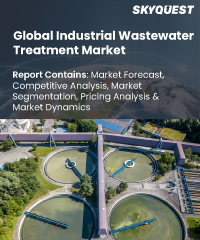
Product ID: SQMIG55D2003

Report ID:
SQMIG55D2003 |
Region:
Global |
Published Date: March, 2024
Pages:
182
|
Tables:
134 |
Figures:
77
According to regional analysis, Asia Pacific's share of the worldwide industrial wastewater treatment market was highest in terms of revenue in 2021. Leading nations for industrial wastewater management include China, India, Japan, and South Korea. The increased market share can be attributed to the area's rapid population growth and urbanization, rising demand for sophisticated residential water treatment, advancements in membrane technology, increased ecological degradation, limited water resources, and an increasing number of public sector investments in water infrastructure. As one of the world's major economies with rapid industrial development, China produces a significant amount of garbage. China emitted 55.7 billion cubic meters of wastewater in 2020, 26% of which came from industrial sources, according to the International Trade Administration (ITA). As part of its growth goal to move toward a cleaner and more sustainable economy, China wants to spend USD 50 billion in a variety of heavily polluting industries, including textiles, printing, coal mining, pharmaceutical manufacture, oil and gas extraction, and steel production.
North American market is anticipated to experience consistent revenue growth. In this area, the U.S. dominates the market, followed by nations like Canada, Cuba, Mexico, Jamaica, and others. Due to a lack of drinking water, there is a global need for clean, pure water. The spread of certain illnesses through water necessitates the supply of clean drinking water and supports the expansion of the market for wastewater treatment services. As a consequence of stringent environmental regulations that forbid the disposal of waste effluents into water, the North American market has expanded. Due to growing levels of water pollution, all of the country's aquatic bodies are contaminated with effluents and are lifeless. Governments in North American nations are acting to provide clean and safe water as a result. The existence of numerous important businesses, including Xylem, Veolia, Dow, and others, is a significant contributor to North America's growth in the wastewater treatment industry. These businesses are offering a number of innovations that are changing the nation's economy on a worldwide scale. For instance, Xylem, a leading global water technology company committed to solving the most challenging water challenges, has created the wastewater pumping device with integrated intelligence. It is the first piece of pumping equipment in the world with such a diverse array of integrated technologies. This cutting-edge, intelligent, networked wastewater pumping system from the Flygt brand of Xylem detects the operating conditions of its surroundings, adapts its performance in real-time, and provides feedback to pumping station operators.
One of the key regional markets in the worldwide industry, the industrial wastewater treatment market in Europe has experienced rapid expansion. Due to large industrial advancements, high utilization by several end-use sectors, including power, chemicals, manufacturing, food & beverage, and increasing disposal of industrial wastewaters, Germany holds a significant market share in this area.
Our industry expert will work with you to provide you with customized data in a short amount of time.
REQUEST FREE CUSTOMIZATIONWant to customize this report? This report can be personalized according to your needs. Our analysts and industry experts will work directly with you to understand your requirements and provide you with customized data in a short amount of time. We offer $1000 worth of FREE customization at the time of purchase.

Product ID: SQMIG55D2003